|
|
|
Sort Order |
|
|
|
Items / Page
|
|
|
|
|
|
|
| Srl | Item |
| 1 |
ID:
139425
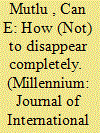

|
|
|
|
|
| Summary/Abstract |
The question of research methods, and their role in the field, is a major source of contention for IR scholars. We can, however, discuss method, methodology, and innovation without revising or revisiting old debates. Methods do not have to be divisive, or disciplining. A frank discussion of research design, methods, and methodological preferences is essential to innovation and reproducibility. This intervention is a call for increased transparency in IR research outputs; IR theorists should not erase their own footprints from their publications and openly admit and discuss failures as productive moments in research. The act of disappearing, which has become the norm in the name of professionalised publications, robs the field of the productive pedagogical potential of research methods. The true impact of research rests in its pedagogical potential. As researchers, our job is thus to find a sensitive balance between not determining the outcome of the research from the get-go by making it all about our preferences and opinions, but also not making the impact of our preferences and opinions disappear completely. Building on this premise, this intervention discusses the significant pedagogical potential of research methods, reproducibility and discussion of failures in International Relations.
|
|
|
|
|
|
|
|
|
|
|
|
|
|
|
|
| 2 |
ID:
090987
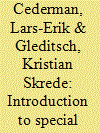

|
|
|
|
|
| Publication |
2009.
|
| Summary/Abstract |
We introduce the contributions to this special issue on "Disaggregating Civil War." We review the problems arising from excessive aggregation in studies of civil war, and outline how disaggregation promises to provide better insights into the causes and dynamics of civil wars, using the articles in this special issue as examples. We comment on the issue of the appropriate level of disaggregation, lessons learned from these articles, and issues for further research.
We introduce the contributions to this special issue on "Disaggregating Civil War." We review the problems arising from excessive aggregation in studies of civil war, and outline how disaggregation promises to provide better insights into the causes
|
|
|
|
|
|
|
|
|
|
|
|
|
|
|
|
| 3 |
ID:
163752


|
|
|
|
|
| Summary/Abstract |
The quality of social science inquiry examining terrorism, insurgency, and nonviolent civil resistance has progressed rapidly in recent years. One reason for this advancement is the emergence of new datasets and the subsequent application of quantitative methods to the analysis of asymmetric political conflict between states and nonstate actors. Despite rapid development within the research paradigm, the use of new data has coincided with several methodological and conceptual challenges. This inquiry employs insights from qualitative social science methodology and organizational sociology to highlight and propose solutions to three shortcomings found in recent quantitative analyses of asymmetric conflict. The first problem arises from scholars’ proclivity to ask research questions based on easily accessible categories of data rather than on theoretically significant puzzles in the literature. The second pitfall concerns limitations and “conceptual stretching” associated with static, nominal variables constructed to enable statistical inference. Finally, the third class of research obstacles arises from selection bias caused by underreporting of data. Each of these methodological problems potentially undermines theoretical claims made in recent work on insurgent organizations, terrorism, civil war, and nonviolent resistance.
|
|
|
|
|
|
|
|
|
|
|
|
|
|
|
|
| 4 |
ID:
094581


|
|
|
|
|
| Publication |
New Delhi, Anmol Publications Pvt. Ltd., 2004.
|
| Description |
xiv, 315p.
|
| Standard Number |
8126117184
|
|
|
|
|
|
|
|
|
|
|
|
Copies: C:1/I:0,R:0,Q:0
Circulation
| Accession# | Call# | Current Location | Status | Policy | Location |
| 054795 | 337.16605412/NED 054795 | Main | On Shelf | General | |
|
|
|
|
| 5 |
ID:
114515
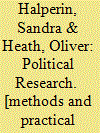

|
|
|
|
|
| Publication |
Oxford, Oxford University Press, 2012.
|
| Description |
xiv, 440p.Pbk
|
| Standard Number |
9780199558414
|
|
|
|
|
|
|
|
|
|
|
|
Copies: C:1/I:0,R:0,Q:0
Circulation
| Accession# | Call# | Current Location | Status | Policy | Location |
| 056784 | 320.072/HAL 056784 | Main | On Shelf | General | |
|
|
|
|
| 6 |
ID:
089341


|
|
|
|
|
| Publication |
2009.
|
| Summary/Abstract |
Emily Jane Charnock, James A. McCann, and Kathryn Dunn Tenpas examine patterns of presidential travel since the Eisenhower years, focusing on the factors that prompt visits to particular states during the first term. The authors argue that electoral considerations are becoming increasingly relevant as presidents decide where and when to travel.
|
|
|
|
|
|
|
|
|
|
|
|
|
|
|
|
| 7 |
ID:
097735
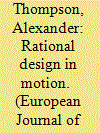

|
|
|
|
|
| Publication |
2010.
|
| Summary/Abstract |
Recent International Relations scholarship offers valuable rational choice explanations for the design of international institutions. However, the rational design literature has relied heavily on institutional outcomes as evidence for testing models. Such studies must be complemented by research designs that analyze the decisions and bargaining that drive design choices in order to expose causal mechanisms and test a wider range of observable implications. I assess an important rational design hypothesis, that uncertainty leads to flexible institutions, by analyzing the negotiations behind the climate change regime and by considering two distinct institutional outcomes across time. While the hypothesis receives considerable support, significant behavior and outcomes do not conform to its logic. I propose refinements for rational design theory in general and work on uncertainty and flexibility in particular. Rational choice theory speaks to the process of institutional design and should not content itself with predicting - and testing itself against - equilibrium outcomes.
|
|
|
|
|
|
|
|
|
|
|
|
|
|
|
|
| 8 |
ID:
184526
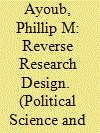

|
|
|
|
|
| Summary/Abstract |
Teaching research design is a core component of a political science curriculum. In our pedagogy, we often do two things separately: expecting students to (1) read and digest the work of established scholars, and (2) explore their own interests in the form of a research design or research paper. In a reverse research design, I bridge these two components with a pedagogical tool. I use a published book or article relevant to the course and students retrace the published author’s process, placing themselves in the author’s shoes. Rewinding some years, students imagine that they are this author writing a grant proposal to conduct the (now-completed) study. This helps students to work through the steps of research design, putting aside until later the more intimidating hurdle of articulating their own research question and project. This article explains reverse research design and describes the teaching resources and methods for implementation.
|
|
|
|
|
|
|
|
|
|
|
|
|
|
|
|
|
|
|
|
|